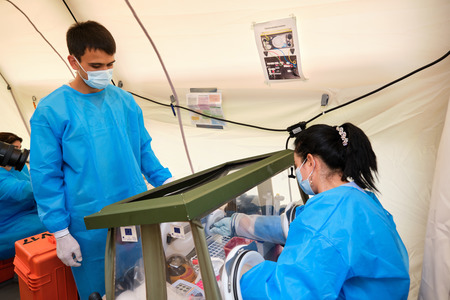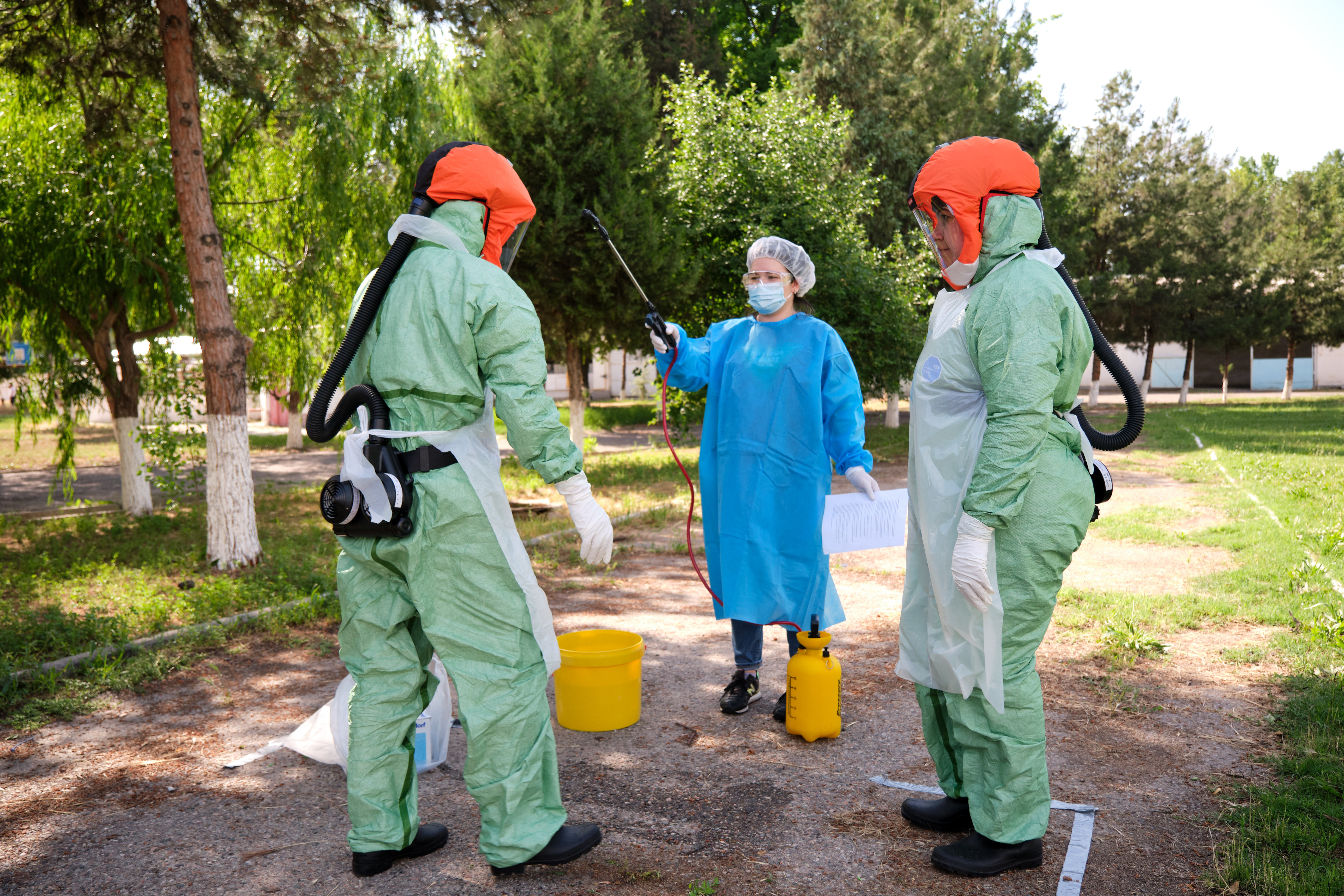Uzbek experts trained to deploy mobile diagnostic laboratories as part of the EU cooperation efforts to fight the COVID19 pandemic

Tashkent, 12 May 2022 year. Outbreaks of infectious diseases pose a substantial risk for public health, especially in remote rural areas where the disease surveillance infrastructures is often limited. This is the case of qualified laboratory specialists and diagnostic capabilities which are mostly located in cities. However, during local infectious disease outbreaks and pandemics it is critical that such resources are available in remote areas to support the population and prevent potential larger outbreaks; this has been true also in the case of the COVID-19 pandemic.
To support the Republic of Uzbekistan with such capacity needs, a field training exercise in the deployment of mobile laboratory units was carried out on 4 -14 May 2022. This training was conducted within the framework of Project 53, which is an activity of the European Union Chemical, Biological, Radiological and Nuclear Centres of Excellence (EU CBRN CoE) Initiative. Financed by the European Union, the project is implemented by the International Science and Technology Center (ISTC) in Nur-Sultan/Kazakhstan. The exercise was held at the Tashkent Branch of the Samarkand Institute of Veterinary Medicine in Zangiota District.
These series of trainings, delivered by the Bundeswehr Institute of Microbiology (IMB) of Germany, are based on two diagnostic mobile laboratory units (conceptualised by IMB) that were handed over to the Ministry of Health of the Republic of Uzbekistan (in July 2021) to support efforts to contain the COVID-19 outbreak. These mobile laboratories are devised to allow the analysis of diagnostic samples against a variety of pathogens in remote and rural regions, where stationary laboratory capacities are not available. The laboratories were assigned to the Republican Specialized Scientific and Practical Medical Center for Epidemiology, Microbiology, Infectious and Parasitic Diseases (RSSPMCEMIPD); and to the Research Institute of Virology (RIV). The equipment will be deployed to detect and respond to the outbreaks of highly infectious diseases.
As part of the field exercise, a demo day to present the capacities of the response teams and the mobile laboratories was organized on 12th May. The exercise, which envisaged simulated disease outbreak conditions was attended by high-level officials from national ministries and diplomatic corps.
In his opening remarks, Mr. Gulyamov, Head of the Regional Secretariat for Central Asia of EU’s CBRN Centre of Excellence Initiative, and Chairman of the Committee for Industrial Safety of the Republic of Uzbekistan said: “The COVID-19 pandemic outbreaks, as many other CBRN related threats, have highlighted the vulnerabilities of countries globally and has made evident to everyone the importance of CBRN risk mitigation work and in particular the significance of capacity building in this sphere. In these areas, international cooperation and support are key.”
“It is the European Union’s hope that the provision of these two mobile laboratories and associated activities, such as training workshops and field exercises not only will strengthen and enhance Uzbekistan existing capabilities and capacities, but will also strengthen and enhance the bonds and cooperation between Uzbek and European experts to work together to face local, regional and global outbreaks,” noted Mr. Alessandro Liamine, acting Head of Cooperation, Delegation of the European Union to the Republic of Uzbekistan.
The designing of the training foreseen a practice-oriented approach in which the trainees were taught all aspects of running the mobile lab in real life scenarios. The trainees were encouraged to autonomously apply their skills in sample handling and real-time polymerase chain reaction (PCR) test and react to new situations with little guidance. This training will be followed by another field exercise during 2022.
Background information:
The EU CBRN CoE Initiative is funded by the European Commission and implemented in cooperation with the United Nations Interregional Crime and Justice Research Institute (UNICRI) and the European Commission Joint Research Centre (JRC). The European External Action Service is also involved in the follow-up to the initiative. The initiative is developed with the technical support of relevant international and regional organizations, the EU Member States, and other stakeholders, through coherent and effective cooperation at the national, regional and international level. The initiative involves 62 countries in eight regions across the world.
The International Science and Technology Center, implementer of Project 53, has managed several hundred projects in Central Asia over the past 25 years. More information about ISTC is available at: www.istc.int


